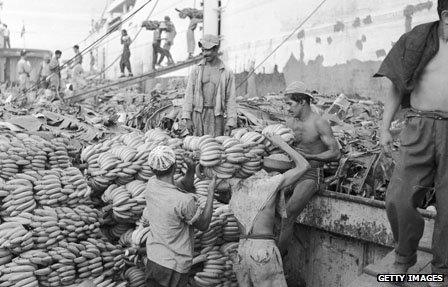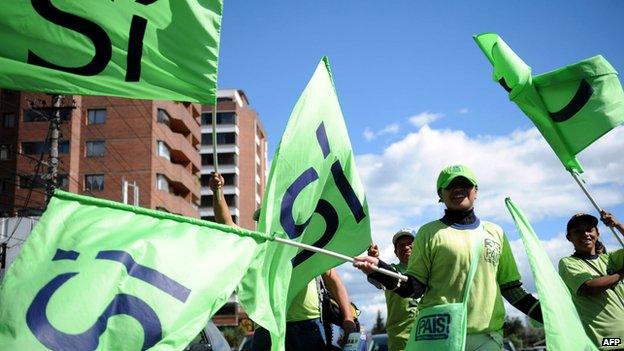Ecuador profile: Timeline
- Published
A chronology of key events:
1450s - Incas of Peru conquer the Caras people, whose kingdom had its capital in Quito.

Bananas, seen loaded at the harbour at Guayaquil circa 1955, are still a major export for Ecuador
1531 - Spanish troops led by Francisco Pizarro land on Ecuadoran coast en route to Peru, where they defeat the Incas.
1534 - Spaniards conquer Ecuador, which becomes part of the Spanish Vice-Royalty of Peru.
1809 - Ecuadoran middle class begins to push for independence.
1822 - Antonio Jose de Sucre, a follower of the independence leader Simon Bolivar, defeats Spanish royalists at the battle of Pichincha; Ecuador becomes part of independent Gran Colombia, which also encompasses Colombia, Panama and Venezuela.
War, economic boom and instability
1830 - Ecuador leaves Gran Colombia and becomes fully independent.
1941 - Peru invades part of the Amazonian mineral-rich province of El Oro.
1942 - Ecuador cedes some 200,000 square kilometres of disputed territory to Peru under the terms of the Rio Protocol.
1948-60 - Growth in banana trade brings prosperity.
1963 - President Carlos Arosemena Monroy deposed by military junta, which implements agrarian reform.
1966 - Interim government takes over from military junta, which was forced to step down following violent demonstrations and harsh retaliation; newly elected constituent assembly chooses Otto Arosemena Gomez as head of state.
1968 - Former President Jose Maria Velasco elected president for the fifth time and, two years later, assumes dictatorial power in response to declining support.
1972 - Oil production starts and Ecuador emerges as a significant oil producer; General Guillermo Rodriguez Lara becomes president after overthrowing President Velasco.
1979 - New constitution heralds return to democracy.
1981 - Brief border war with Peru.
Economic deterioration
1982 - A deterioration of the economy due to falling oil prices leads to strikes, demonstrations and a state of emergency.
1987 - President Leon Febres Cordero kidnapped and beaten up by the army in protest at policies of privatisation and public expenditure cuts.
1992 - Indigenous peoples granted title to 2.5 million acres in Amazonia; Ecuador leaves the Organisation of Petroleum Exporting Countries to increase its oil output.
1996 - Abdala Bucaram Ortiz elected president.
1997 - Fabian Alarcon becomes president after mr Bucaram is deposed by parliament on grounds of mental incapacity.
1998 - Jamil Mahuad elected president.
2000 - Vice-President Gustavo Noboa becomes president after Mr Mahuad is forced to leave office by the army and indigenous protesters; Ecuador adopts the US dollar as its national currency in an effort to beat inflation and stabilise the economy.
2002 - Protests by indigenous peoples bring oil production to a near standstill. The protesters demand that more of the oil revenues should be invested in their communities.
Gutierrez elected
2002 November - Leftist and former coup leader Lucio Gutierrez wins presidential elections. He takes office in January 2003.
2005 April - Anti-government protests mushroom after a reformed, pro-government Supreme Court drops corruption charges against two former presidents. Congress votes to oust President Gutierrez. Alfredo Palacio replaces him.
2005 August - Protesters, demanding that oil revenues should be spent on infrastructure, bring oil production to a halt. A state of emergency is declared in two oil-producing provinces. The protest ends after oil companies agree to help mend roads and pay local taxes.
2006 June - Ecuador prompts US ire by cancelling the operating contract of the US oil firm Occidental Petroleum after it allegedly sold part of an oil block without government permission.
Correa elected
2006 November - Socialist candidate Rafael Correa wins presidential election.
2007 October - President Correa's Alianza PAIS party wins 80 of the 130 seats in elections for a new constituent assembly, and a large majority in subsequent congressional elections in November.
2008 March - Diplomatic crisis after a Colombia cross-border strike into Ecuador kills senior Farc rebel Raul Reyes. Ecuador cuts ties with Colombia briefly.
2008 April - Defence Minister Wellington Sandoval and top military chiefs resign amid continuing row over Colombian raid on Farc rebels inside Ecuador.
New constitution
2008 September - The new constitution backed by President is approved by 64% of voters in a referendum.
2008 December - President Correa says Ecuador will officially default on billions of dollars of "illegitimate" foreign debt.
2009 April - President Correa wins his first term under the 2008 constitution - his second overall.
2009 July - Government refuses to extend US military's use of Manta air base on Pacific coast for drug surveillance flights.
2010 July - New law further increasing state control over oil industry comes into effect. Under the new legislation, the Ecuadorean state will own 100% of oil and gas produced.
Crisis of 2010
2010 September - President Correa declares a state of emergency after being taken hostage by mutinous policemen. He is later freed by elite army soldiers.

President Correa won a 2011 referendum that gave him more power
2011 February - US oil giant Chevron is fined £5.3 billion for polluting the Amazon.
2011 April - Ecuador expels US ambassador after Wikileaks publishes diplomatic cable alleging widespread corruption in the Ecuadorean police force.
2011 May - Voters approve a wide-ranging package of reforms proposed by President Correa in a referendum. Critics say the changes enhance the president's powers even further.
2011 July - The owners of opposition paper El Universo and a journalist are found guilty of libelling the president and sentenced to three years in jail and a $40 m fine. They are later pardoned.
2012 March - Thousands of indigenous people stage a two-week march from the Amazon to protest against mining projects.
2012 June - Founder of Wikileaks Julian Assange takes refuge in Ecuador's London embassy and appeals for political asylum, in order to escape extradition to Sweden on rape charges. Asylum granted the following month, causing a diplomatic row with Britain.
Correa re-elected
2013 February - President Rafael Correa wins another four-year term - his second under the 2008 constitution, which limits him to two terms.
2013 June - Parliament approves a law which creates an official body with powers to sanction media and redistribute broadcasting frequencies. Opponents describe it as a gagging law.
2013 August - President Correa says he is authorising oil exploration in a pristine part of the Amazon rainforest because rich nations had failed to fund conservation.
2015 December - Parliament scraps presidential term limits.
2016 April - More than 400 people die and 2,500 are injured in 7.8-magnitude earthquake on Pacific coast. Billions of dollars worth of damage is caused.
2017 May - Lenin Morena takes office as president after winning election.
2017 July - Row erupts over a border wall which Ecuador has built along a canal in the city of Huaquillas as a flood defence. Peru says it could increase the risk of flooding.
2018 February - Ecuadoreans vote in a referendum to prevent presidents from holding more than two terms in office.
2019 October - Government restores fuel subsidies in a deal with indigenous leaders to end mass protests that brought the capital Quito to a standstill.
2021 May - Guillermo Lasso ends 14 years of centre-left rule by beating socialist candidate Andes Arauz to the presidency.